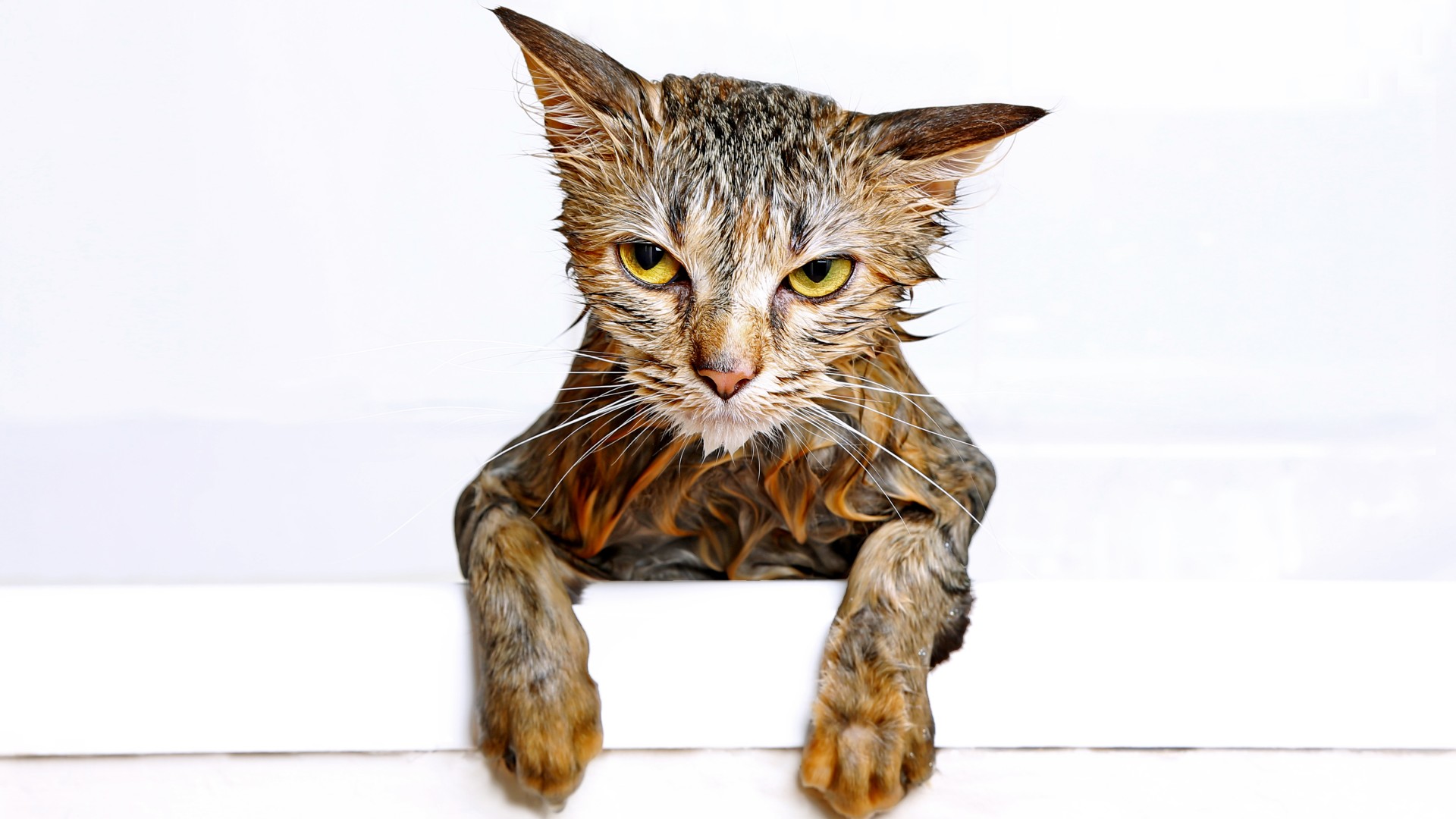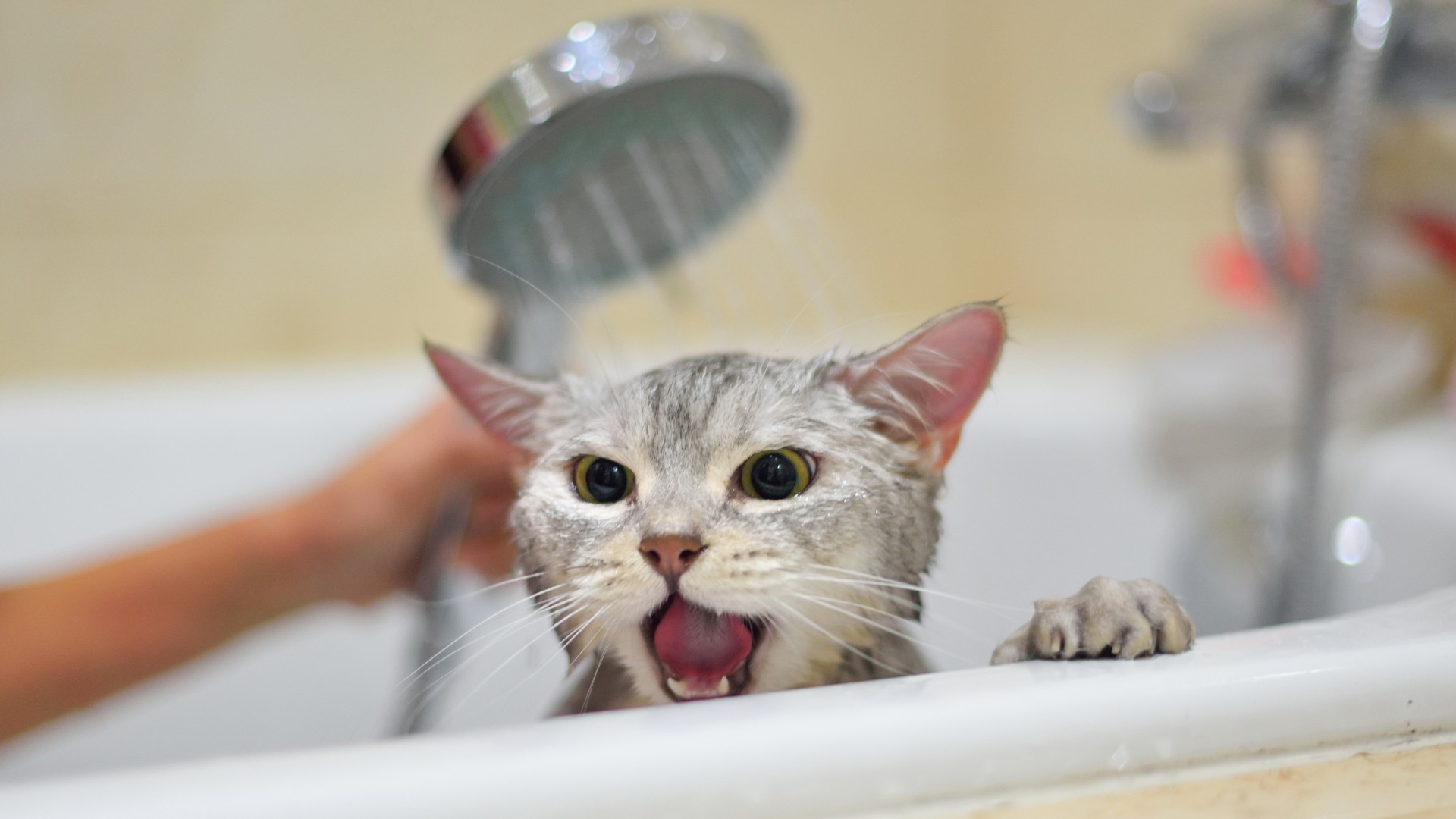Why do cats hate water? We dove deep to find out
Why do cats hate water so much? Our guide reveals what it is about the wet stuff our feline friends loathe

Why do cats hate water? Where to begin! If you’ve ever tried to get your feline furkid into the bath to clean them off then you’re likely familiar with the crazed look that quickly spreads across their face as they desperately try to wrestle free from your clutches.
While there are a few exceptions amongst the rarest cat breeds in the world, most of our kitty companions are well known for their aquaphobia and would prefer to do almost anything other than float around in the cold wet stuff. And yet, they’re also kind of fascinated with it too, dipping their paws in the sink or dunking their heads to take a drink out of a running faucet.
So, what gives? How can these curious creatures both loathe the water and love it at the same time? We’re so glad you asked! We’ve been wondering why do cats hate water for some time so we decided it was time to investigate. Diving deep we found the answers and a few of them might just surprise you.
Water weighs a cat down
Imagine getting up in the morning and pulling on a nice wet pair of jeans and an equally drenched sweater. Now imagine having to walk around in them until they dried off. They’d probably feel pretty darn heavy and you’d feel mighty uncomfortable, right?
Well, that’s exactly how our feline friends feel when they get fully drenched. Although their top coat has some degree of water resistance, if the coat gets soaked all the way through then they can feel weighed down and unable to move with their usual degree of agility.
Cats have fluffier and less waterproof coats than their canine counterparts because they regularly groom themselves by licking, which stops the natural skin oils from building up on their fur. Because of that the water can’t slip off their fur in the same way it does when a dog shakes so they end up taking a lot longer to dry off.
Put it down to evolution
While it’s true that wild cats living in hot climates may occasionally go for a dip to cool themselves off and regulate their body temperature, most domestic cats descend from felines that lived in areas where bathing wasn’t necessary to their survival. Because of that, kitties have evolved to be largely water averse.
“Domestic cats were descended from Arabian wild cats,” Dr. John Bradshaw, a professor at the University of Bristol’s School of Veterinary Sciences, explains. “Their ancestors lived in an area with very few large bodies of water. They never had to learn how to swim. There was no advantage to it.”
Living in dry arid places meant it was rare for wild cats to ever come across a body of water and even though domestic cats now live side by side with humans in places where water is everywhere, they still retain the same instincts in their DNA.
Negative experiences

The reason some cats are more water averse than others may be due to their previous experiences. If a cat was gently introduced to water as a kitten and it was a pleasurable or neutral experience for them, they’ll likely respond better as adults than cats who had a stressful experience.
Some cats may also have experienced being squirted with water as a form of discipline or instead of being fitted with a flea collar for cats or having a topical flea treatment applied, they may have been dunked into a flea bath. All of these things can cause a cat to associate water with stress and anxiety.
A lack of control
When you see your kitty drinking from the faucet or putting their paws in puddles, you might find yourself wondering why they can do those things but won’t let you put them in the bath. The likely answer is that being submerged into a tub makes them feel like they don’t have any control.
On dry land, your cat can quickly run for shelter if your mean neighbor decides to turn the hose on them to get them out of their garden or the sky suddenly darkens and unleashes a downpour. But put your kitty onto a slippery surface where there’s no easy escape, with water being poured over them that’s running into their eyes and weighing down their coat, and there’s a good chance they’ll feel stressed out.
Are there any cats that like water?
While most cats would be content to never set paw in water for as long as they live, there are a few breeds who can’t get enough of the cold wet stuff. Adventurous breeds like the Bengal, American Bobtail, Manx, Maine Coon, and Turkish Van and those with thick water-resistant coats that have been designed to keep them warm in cold climates, like the Norwegian Forest Cat, will happily paddle about.
In fact, the Turkish Van loves water so much that it’s earned itself the nickname ‘the swimming cat’ thanks to its eagerness to completely submerge itself in water whenever it gets the chance. And the Bengal has been known to happily jump in the tub with some of the best cat toys and splash and play for hours.
Not all cats who love water have moisture-deflecting coats but many do, which is why water is more appealing to them. They can get themselves fully wet and dry off quickly like a dog can, without their fur absorbing and retaining water.
As for why some cats like watching water but won’t go near a bath, animal behaviorist Kelley Bollen says it’s not the water itself that interests them but the movements it makes. “That flickering pattern, the light coming off the water, is hard-wired into their brain as a potential sign of prey. It’s not because it’s wet. It’s because it moves and makes interesting noises. Something moving is a potential thing to eat.”
PetsRadar Newsletter
Get the best advice, tips and top tech for your beloved Pets

Kathryn is a freelance writer who has been a member of the PetsRadar family since it launched in 2020. Highly experienced in her field, she's driven by a desire to provide pet parents with accurate, timely, and informative content that enables them to provide their fur friends with everything they need to thrive. Kathryn works closely with vets and trainers to ensure all articles offer the most up-to-date information across a range of pet-related fields, from insights into health and behavior issues to tips on products and training. When she’s not busy crafting the perfect sentence for her features, buying guides and news pieces, she can be found hanging out with her family (which includes one super sassy cat), drinking copious amounts of Jasmine tea and reading all the books.
